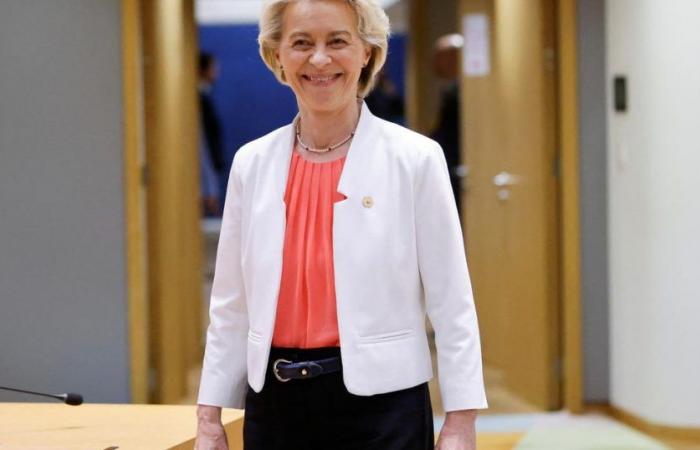By demanding that the presidency of the European Council return to it mid-term, the EPP delayed the decisions of the Twenty-Seven on the highest positions in the EU.
Correspondent in Brussels
The Twenty-Seven failed to agree on the casting for the highest positions in the EU. Gathered in Brussels for an informal summit, they left Monday evening, June 17, a little before midnight, without white smoke. At issue: the last minute request from the EPP. It is necessary that “it’s simmering», Explained Emmanuel Macron with a smile as he left the meeting, specifying that reaching an agreement before the French elections “is not a goal in itself“. In any case, European leaders will meet again next week, on June 27 and 28, for a formal summit this time.
Every five years, after the European elections, the Twenty-Seven must agree on the appointments to the highest positions in the EU: the presidency of the Commission, the presidency of the European Council and the high representative of the EU for Foreign Affairs. Choices are made on the basis of the results in the European elections. And, as in 2019, the EPP, the European Socialists and the Renew Liberals are the only ones who can together form a majority in Strasbourg. We still need to agree on the distribution of positions.
In recent days, a consensus seemed to be emerging. Arriving well in the lead, the EPP was to retain the presidency of the Commission, paving the way for the reappointment of Ursula von der Leyen for a second term. In second place, the Social Democrats (S&D) were in a position to obtain the presidency of the European Council, entrusted to the Portuguese Antonio Costa. And the Renew liberals, in sharp decline, were to inherit the post of high representative, promised to the Estonian Kaja Kallas. This trio has the advantage of preserving the political and geographical balances of the EU. And in recent days, both Emmanuel Macron and Chancellor Olaf were hopeful of being able to carry out the matter smoothly. When he arrived at the Council, the German leader repeated his wish to move quickly. “The elections went badly for him and for the coalition he leads. He wants to quickly turn the page», sneers a member of the European Parliament.
A problem of equilibrium
This was without taking into account the last-minute request from the EPP leaders. Building on the good results of their party in the European elections – the European right won 190 seats against 176 in the outgoing Parliament -, significantly better than those of the Social Democrats and the Liberals, they proposed to obtain half of the mandate of the presidency of the European Council, in addition to the presidency of the Commission at “VDL” and the extension for two and a half years of Roberta Metsola in the European Parliament. Concretely, the EPP would like the presidency of the European Council to be split in two and for the second part to go to a member of its political family. It was the Croatian Andrej Plenkovic who put this idea on the table in the afternoon, during the EPP summit organized before the meeting of the Twenty-Seven. In absolute terms, the presidency of the European Council is given for 2.5 years, renewed once by the Twenty-Seven. This is what the EU Treaty provides. Except that the Belgian Charles Michel who currently occupies the position as well as his two predecessors have systematically been renewed mid-term. Breaking up the position means upsetting the political balance of the planned casting, to the detriment of the European socialist family.
Moreover, this proposal was swept aside in the evening by a number of ambassadors. “If they want half the presidency of the European Council, then let’s also cut the presidency of the Commission in two» (promised to the PPE Ursula von der Leyen, Editor’s note), quipped one of them. Obviously, European socialists don’t want to hear about it.
“Ask a lot to get more”
In reality, the objective of the EPP is to raise the stakes. “We ask a lot to have more», Summarizes a member of the party. The objective would in particular be to obtain a position of executive vice-president at the Commission or, more precisely, to keep the one which was created in 2019 – well after the negotiations on “top jobs” – and which is occupied by the Latvian Valdis Dombrovskis. This seems certain. The head of the party and the group in the European Parliament, the German CSU Manfred Weber, also wants the very sensitive agriculture portfolio to return to an EPP. Above all, it is a question of securing, after the proposal of the Twenty-Seven, the election of Ursula von der Leyen to the European Parliament which promises to be very close.
Read alsoHow Charles Michel tries to torpedo the candidacy of Ursula von der Leyen
On paper, “VDL” would easily obtain an absolute majority of 361 votes since the three parties in the coalition hold 406 seats. But votes are taken by secret ballot and votes could be missing. By setting the bar high and agreeing to lower its demands, the center-right party hoped to obtain assurances from social democratic leaders to put pressure on their delegations in Strasbourg, at the time of the vote, scheduled for 18 July. Some MEPs have, in fact, threatened not to support the outgoing president, whom they consider too accommodating to the Italian Giorgia Meloni, positioned on the extreme right. “We need certainty for the VDL election. If this election were to fail, we could then oppose in 2026 the reappointment of Antonio Costa for two and a half more years as President of the European Council», We told the PPE in the evening.
By asking too much, the EPP came up empty this Monday. “They wanted to push their advantage too far and it backfired on themwe analyze in the entourage of a leader. They will have to land if they want the support of the social democratss”. Ursula von der Leyen, who was expected to be reappointed on Monday by the Twenty-Seven, has little other option than to wait ten more days, while she must begin negotiations as quickly as possible with the various groups of the European Parliament. She still has all her chances. With the exception of the Hungarian Viktor Orban, the leaders are still ready to propose her for a second term. Antonio Costa and Kaja Kallas are also in the running for the two EU posts.
Orban with his feet in the dish
Unless Giorgia Meloni screws up the casting. Arriving as the winner at the summit, with almost 29% obtained by her party in the elections, the President of the Italian Council and leader of the European Conservatives and Reformists (CRE) found herself relegated to the second division during the meeting. The CRE is not a stakeholder in the future coalition. Meloni was therefore not associated with the work of the six negotiators: the Greek Kyriakos Mitsotakis and the Pole Donald Tusk for the EPP; the German Olaf Scholz and the Spaniard Pedro Sanchez for the S&D; Emmanuel Macron and the Dutchman Mark Rutte for Renew. The latter held numerous meetings in small groups throughout the evening and again after the end of the dinner. Giorgia Meloni would have preferred that the results of the elections – and the breakthrough of the nationalist right – were discussed more and that the Twenty-Seven drew the consequences both in terms of policies to be implemented and for “top jobs”. “She wasn’t happy. She wanted to make the point. But the party she chairs (CRE, Editor’s note) is not in the coalition», summarizes a European diplomat. Viktor Orban, on the same line as the Italian leader, put his foot down in a long message posted on X after the meeting. “The will of the European people was ignored today in Brussels. The result of the European elections is clear: the right-wing parties have strengthened, the left and the liberals have lost ground. The EPP, on the other hand, instead of listening to voters, finally teamed up with the socialists and liberals: today they reached a deal and shared the highest posts in the EU“.
When the Twenty-Seven meet next Thursday in Brussels, the balance of power could be more favorable to the European party chaired by Giorgia Meloni. According to the latest projections, it has 76 seats compared to 80 for Renew. Through the game of rallies – notably that of Viktor Orban’s Fidesz – it is not excluded that the European Conservatives and reformists will pass in front of Renew, then becoming the third force in Strasbourg. Enough to carry more weight in the discussions and obtain a substantial position at the Commission. The counters of the Renew and CRE groups will freeze on Wednesday June 26. The day before the summit.






